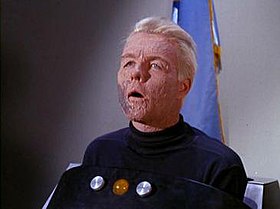The Menagerie (Star Trek: The Original Series)
| "The Menagerie" | |
|---|---|
| Star Trek: The Original Series episode | |

The disabled Fleet Captain Christopher Pike
|
|
| Episode no. | Season 1 Episode 11/12 |
| Directed by |
|
| Written by | Gene Roddenberry |
| Featured music | Alexander Courage |
| Cinematography by |
|
| Editing by |
|
| Production code | 016 |
| Original air date |
|
| Running time |
|
| Guest appearance(s) | |
|
|
"The Menagerie" is a two-part episode of the American science fiction television series, Star Trek. It consists of episodes 11 and 12 (production #16) of the show's first season and is the only two-part story in the original series. Part one of the episode was broadcast on November 17, 1966, with part two broadcast on November 24, 1966. NBC repeated the two shows on May 18 and 25, 1967. The episode was written by Gene Roddenberry. Since the true 1965 pilot episode, "The Cage", was not shown on television until 1988 and the original series began with the second pilot, "Where No Man Has Gone Before", Desilu (the show's production company) made a decision on what should be done with the wasted footage from the unused pilot movie.
Incorporating "The Cage" into the two-part episode, "The Menagerie", was actually a solution to a large and growing problem with the show's production. Its special effects, unprecedented for a weekly television production, were causing delays in the completion of each episode. The problem was cumulative, with shows getting delivered to NBC later and later. At its worst, episodes (filmed in Los Angeles) were being delivered to NBC (in New York) only three days before their scheduled Thursday airing. Sensing impending disaster, Roddenberry solved the problem by writing a two-part episode that needed only one week of production.
He did this by writing an entirely new bookend story, so that "The Cage" would serve as a backstory for the starship Enterprise's early history. New footage would be combined with the old and placed into the continuity of the overall Star Trek storyline.
"The Menagerie" won a Hugo Award for Best Dramatic Presentation. This episode also served as the inspiration for the term "reality distortion field", referring to Apple co-founder Steve Jobs' ability to convince audiences of his narrative.
...
Wikipedia
